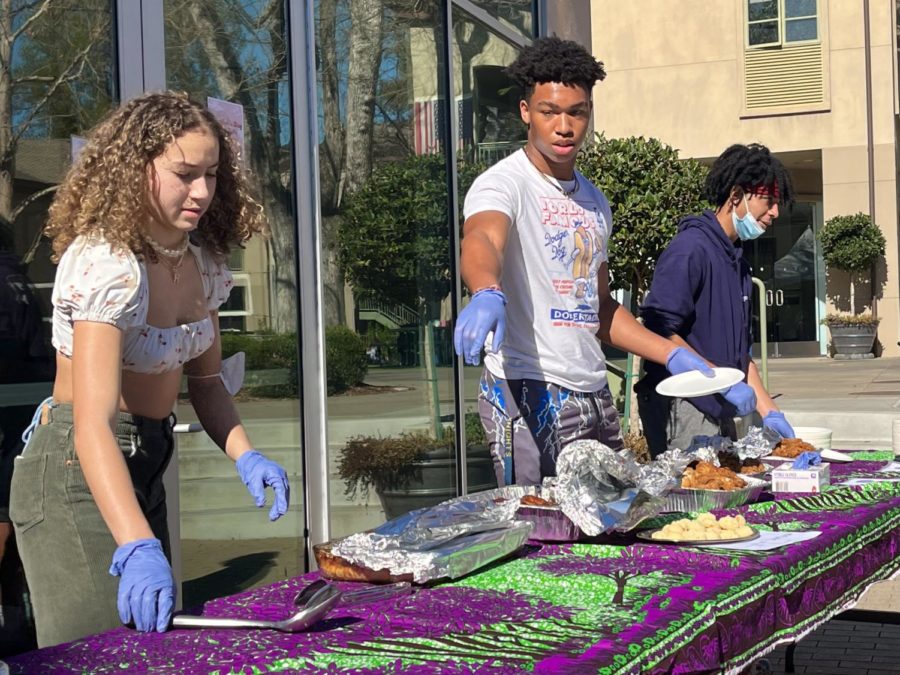Black History Month at Menlo Goes Beyond African American Commemoration
Senior Sammie Floyd, junior Ralston Raphael and sophomore Willis Johnson serve traditional African American foods at a lunchtime barbecue fundraiser outside the Student Center on Friday, Feb. 11. Staff photo: Karen Xin.
February 24, 2022
Black History Month isn’t just a 28-day commemoration of African Americans; it’s about strengthening connections, diving deeper into one’s identity and celebrating all people. In February 2022, Black History Month coincides with Supreme Court Justice Stephen Breyer’s retirement and, consequently, President Joe Biden’s announcement to nominate a Black woman in Breyer’s place.
Members of the Menlo community see the potential for Biden’s decision to inspire women of color to pursue higher careers, alter the outcome of judicial decisions and create change at a national scale. “I am all in favor [of] it,” Black Student Union adviser Saletha Okunnuga said. “I think it’s long overdue and that it will bring a new perspective to the Supreme Court that maybe right now won’t exactly shift [the court].” Still, Okunnuga is hopeful that the new justice could positively impact the country for decades to come.
While Okunnuga and other Black Menlo students and faculty agree with Biden’s intent, they’re critical of the way he presented it. They worry that his focus on the newly appointed justice’s demographics gives the public a chance to deem the nominee as unqualified for the position.
“I feel like it’s sort of ironic that Biden said, ‘Oh, I’m going to do this. I’m going to select a Black woman specifically,’” Equity, Diversity and Inclusion Associate Director for Restorative Practices Carmen Borbón said. “Not because I don’t think that should be done, but I feel like now, already people are questioning, ‘Oh, well, he’s just going to choose a Black candidate, and [make] the assumption that whoever is chosen is not going to be qualified.’ And to me, that’s super offensive.”
Black Student Union Co-President Sammie Floyd agrees with this sentiment. “I mean, [the justice selection] didn’t necessarily have to be marketed as a Black woman,” Floyd said. “It [could have just been to] appoint someone qualified, but in today’s day and age, that is the distinction. A Black woman cannot just be a judge. She has to be a Black [female] judge.”
Borbón also feels hurt that her work could be overlooked in an organization where Black people make up a small minority. “[My first year at Columbia] was the same year that, here in California, they eliminated affirmative action at the UCs. And so on my college campus, I remember hearing students say, ‘Well, you’re only here because they needed to meet a quota, and they needed some Black or brown person to [get them] there.’ And that’s hurtful because I worked my [butt] off to get to where I was,” Borbon said.
According to Chief of Equity, Diversity and Inclusion Keith Wheeler, race isn’t the sole focus of one’s identity. “I am standing on the shoulders of my ancestors. They are cheering, from the heavens above, for me to represent them, to [not only] speak for them, but to also draw people into the beauty of who we are,” Wheeler said. “We are more than actors, entertainers, athletes […]. We’re also flawed human beings with much more progress to make. But you’ll never know this if you don’t decide to go deeper into who I am, or who I possibly could be.”
Wheeler also believes that this month isn’t limited to celebrating one person or a particular group of people. “We should not relegate ourselves to saying, ‘I only celebrate and uplift the stories and champion the stories of Black people in America on this month, on this day,’” he said. “Tomorrow should be […] Asian American Day. Friday should be Native American Day.”
Wheeler hopes that Black History Month will inspire people to celebrate all aspects of everyone, beyond the month of February. “We should be learning constantly about each other, each and every single day. As long as you have breath in your body and air in your lungs, you should be learning about someone other than yourself,” Wheeler said. “Life is an interesting balance of inquiry, interrogation and investigation. We must all strive as a collective humanity to build– build new knowledge, build new relationships and build new thinking.”


